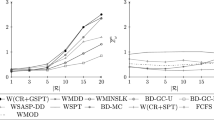Abstract
Anticipatory algorithms for online stochastic optimization have been shown very effective in a variety of areas, including logistics, reservation systems, and scheduling. For such applications which typically feature purely exogenous uncertainty, the one-step anticipatory algorithm was shown theoretically to be close to optimal when the stochasticity of the problem, measured by the anticipatory gap, is small. This paper studies the behavior of one-step anticipatory algorithms on applications in which the uncertainty is exogenous but the observations are endogenous. It shows that one-step anticipatory algorithms exhibit a much larger anticipatory gap and proposes a number of gap-reduction techniques to address this limitation. The resulting one-step anticipatory algorithms are shown to outperform significantly the state-of-the-art dynamic-programming approach on an online stochastic resource-constrained project scheduling application.
This research is partially supported by NSF award DMI-0600384 and ONR Award N000140610607.
Preview
Unable to display preview. Download preview PDF.
Similar content being viewed by others
References
Bent, R., Van Hentenryck, P.: Scenario-Based Planning for Partially Dynamic Vehicle Routing Problems with Stochastic Customers. Operations Research 52(6) (2004)
Bent, R., Van Hentenryck, P.: Waiting and Relocation Strategies in Online Stochastic Vehicle Routing. In: IJCAI 2007 (2007)
Choi, J., Realff, M., Lee, J.: Dynamic Programming in a Heuristically Confined State Space: A Stochastic Resource-Constrained Project Scheduling Application. Computers and Chemical Engineering 28(6-7), 1039–1058 (2004)
Mercier, L., Van Hentenryck, P.: Performance Analysis of Online Anticipatory Algorithms for Large Multistage Stochastic Programs. In: JCAI 2007 (2007)
Mercier, L., Van Hentenryck, P.: AMSAA: A Multistep Anticipatory Algorithm for Multistage Stochastic Combinatorial Optimization. In: CPAIOR (submitted, 2007)
Parkes, D., Duong, A.: An Ironing-Based Approach to Adaptive Online Mechanism Design in Single-Valued Domains. In: AAAI 2007, pp. 94–101 (2007)
Thomas, M., Szczerbicka, H.: Evaluating Online Scheduling Techniques in Uncertain Environments. In: The 3rd Multidisciplinary International Scheduling Conference (2007)
Van Hentenryck, P., Bent, R.: Online Stochastic Combinatorial Optimization. The MIT Press, Cambridge (2006)
Author information
Authors and Affiliations
Editor information
Rights and permissions
Copyright information
© 2008 Springer-Verlag Berlin Heidelberg
About this paper
Cite this paper
Dooms, G., Van Hentenryck, P. (2008). Gap Reduction Techniques for Online Stochastic Project Scheduling. In: Perron, L., Trick, M.A. (eds) Integration of AI and OR Techniques in Constraint Programming for Combinatorial Optimization Problems. CPAIOR 2008. Lecture Notes in Computer Science, vol 5015. Springer, Berlin, Heidelberg. https://doi.org/10.1007/978-3-540-68155-7_8
Download citation
DOI: https://doi.org/10.1007/978-3-540-68155-7_8
Publisher Name: Springer, Berlin, Heidelberg
Print ISBN: 978-3-540-68154-0
Online ISBN: 978-3-540-68155-7
eBook Packages: Computer ScienceComputer Science (R0)




